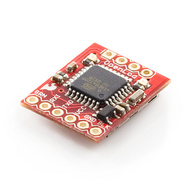-
Notifications
You must be signed in to change notification settings - Fork 223
Logger Comparison
This is a quick comparison of the different FAT data loggers that we know of in the embedded world.
Yes, that’s us. We rock. OpenLog is small, cheap, and does one thing well, log data.
- Mates directly with Arduino Pro and Arduino Pro Mini
- Basic serial STK500 bootloader comes pre-installed so that you can tweak the firmware to your heart’s content
- Very compact
- Supports FAT16 (up to 2GB)
- Very few bells and whistles
- Based on ATmega328 @ 16MHz and 3.3V
Logomatic is pretty phenomenal. It uses an ARM7 LPC2148 and does some really cool stuff.
- Obviously it datalogs
- Has a USB mass storage device profile built in. So when you attach USB, you get a fancy drive on your computer where you can see the actual files on the SD card. This is nice because it doesn’t require a microSD card reader.
- Has an external battery connector. This makes the board a very independent data logger; you don’t need any other microcontroller.
- Has RTC for file date/time data.
- On/Off switch is handy
- Comes with SD+USB bootloader that allows the end user to tweak firmware for their own bubble logging projects.
- Configuration is done through an on-board configuration file, so no need to type in commands!
- Fairly compact for what it offers
The uLog (pronouced micro log) is a very compact data logger. It was designed for use with rocketry and accelerometers but has many applications.
- Uses an ATtiny24 to read up to 3 channels of analog data
- 16 mega bit on-board EEPROM is a little limiting (only 1MB of usable space across 3 analog channels)
- Has on-board power connector which makes it very easy to use
The MicroDrive from 4D Systems is very good but we found some limitations.
- Very well documented
- Auto-baud feature is neat, but can be difficult for first time users
- Has advanced features including read/write file locations
- Upgradable firmware but not open source
The command structure is great for advanced users, but we created OpenLog because we believe 90% of users just need something basic that logs serial immediately.
There are various SD shields for the Arduino including SparkFun’s microSD Shield and AdaFruit’s GPS logger shield kit. These work very well, but in general require the FAT code to be located on the Arduino’s ATmega. FAT is fairly large and burly and we wanted to offload the majority of functionality to an external board. Remember, your project should be your project – don’t get hung up on the peripheral requirements.





